被动语态
图片预览
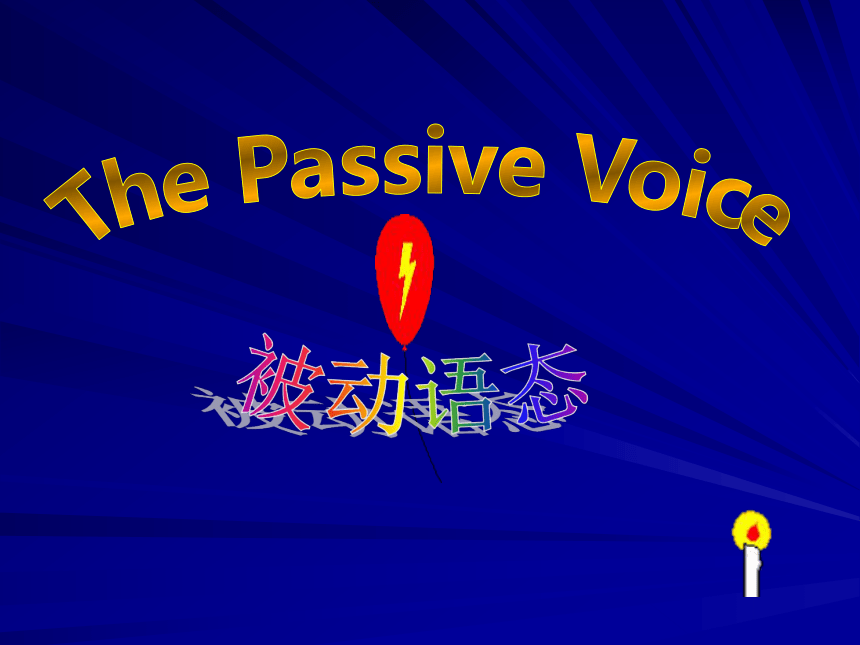

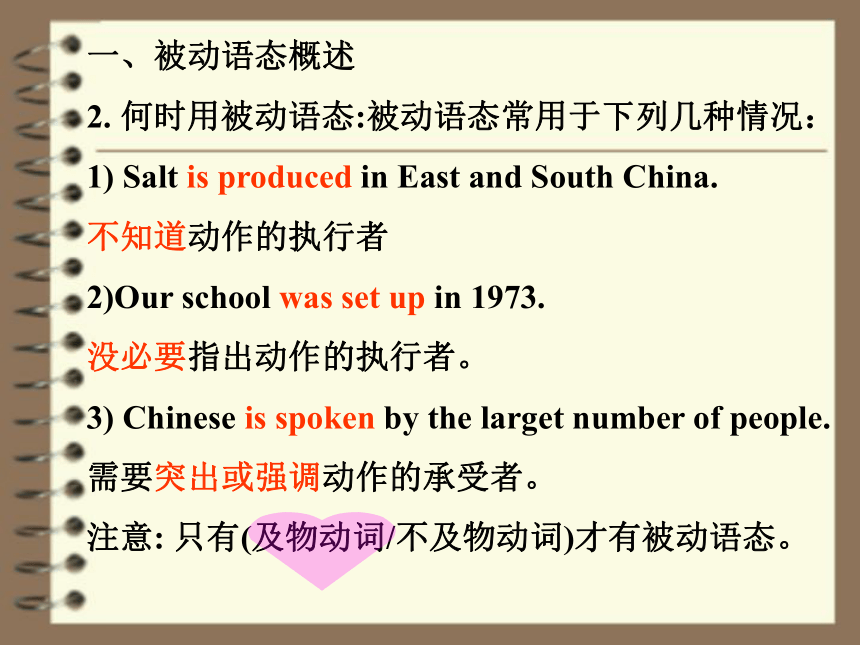
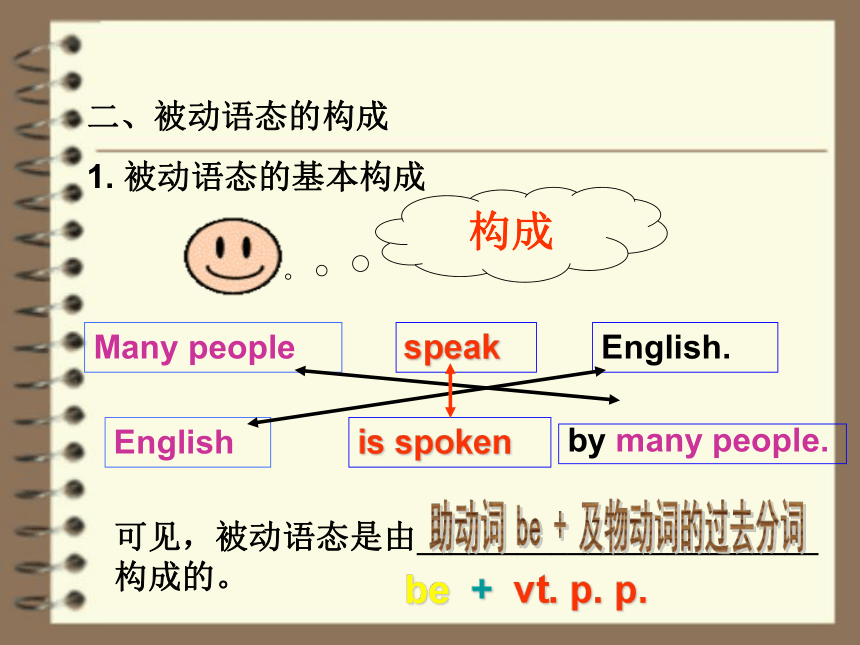
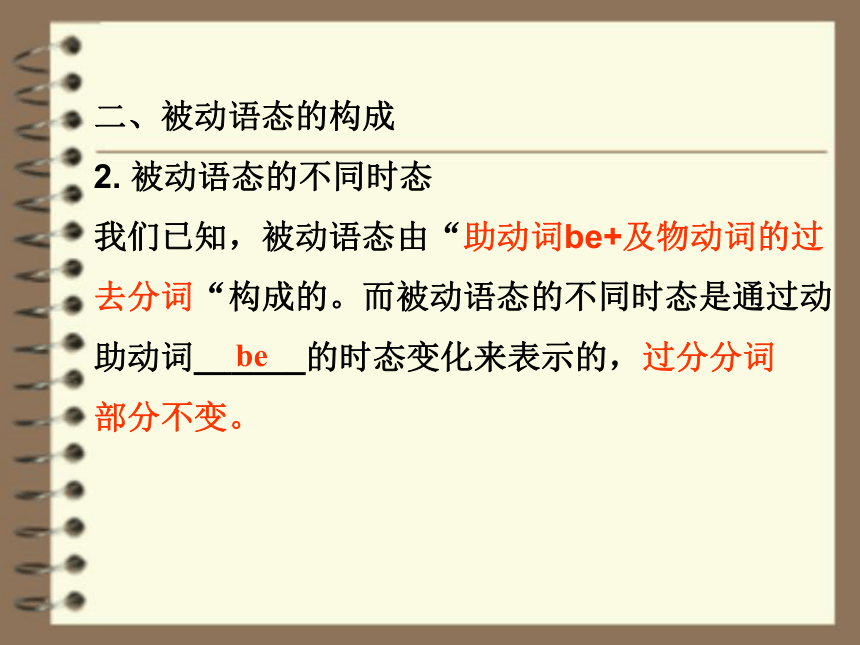
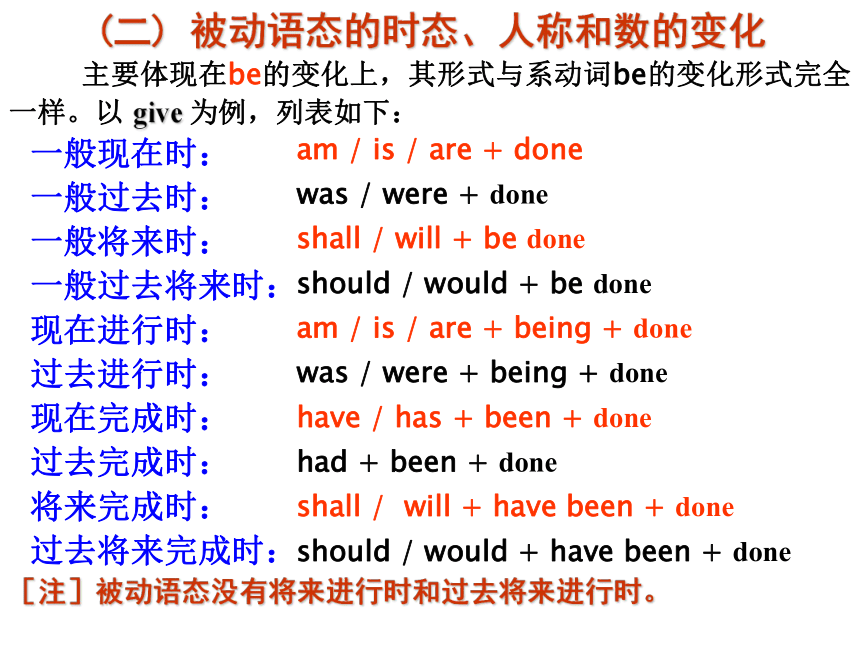
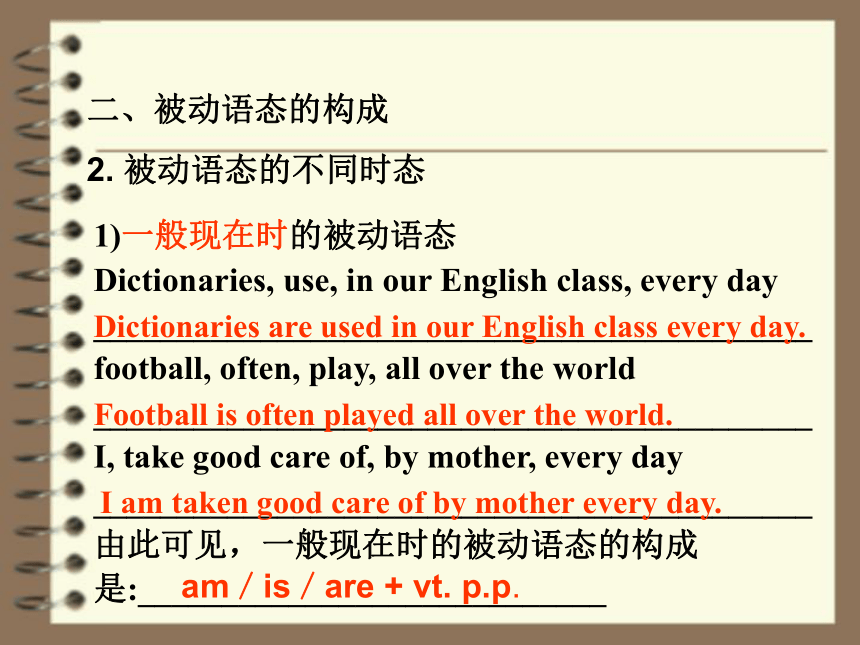
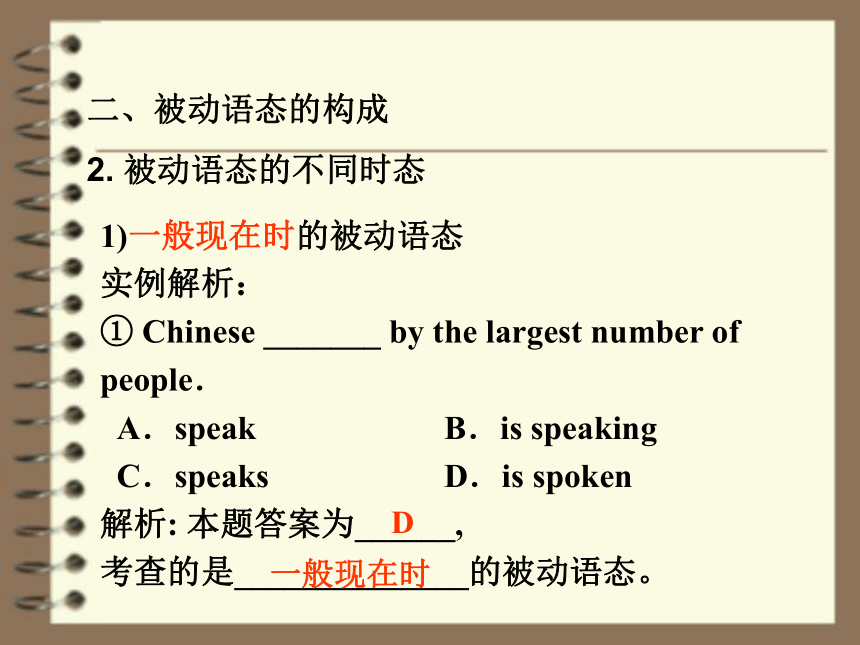

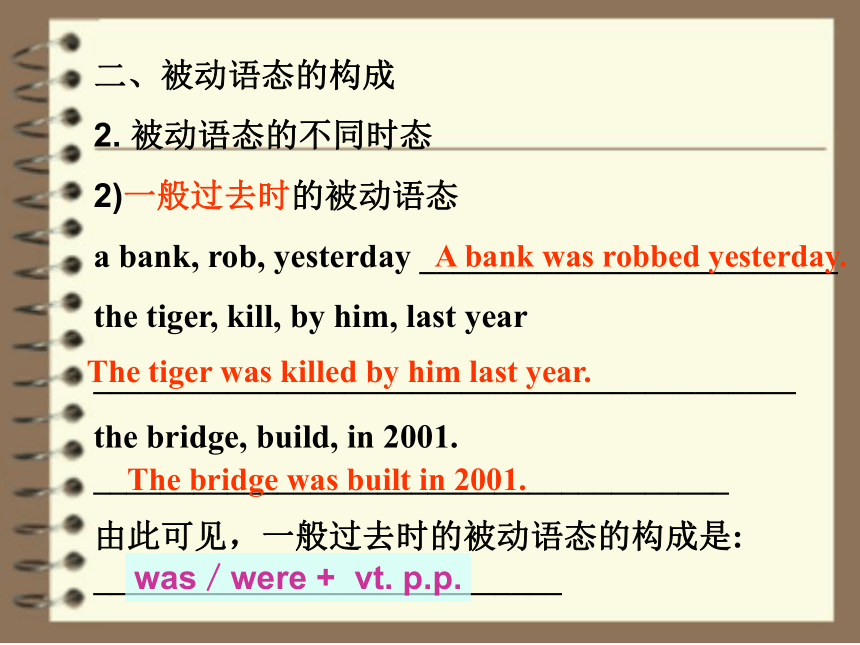
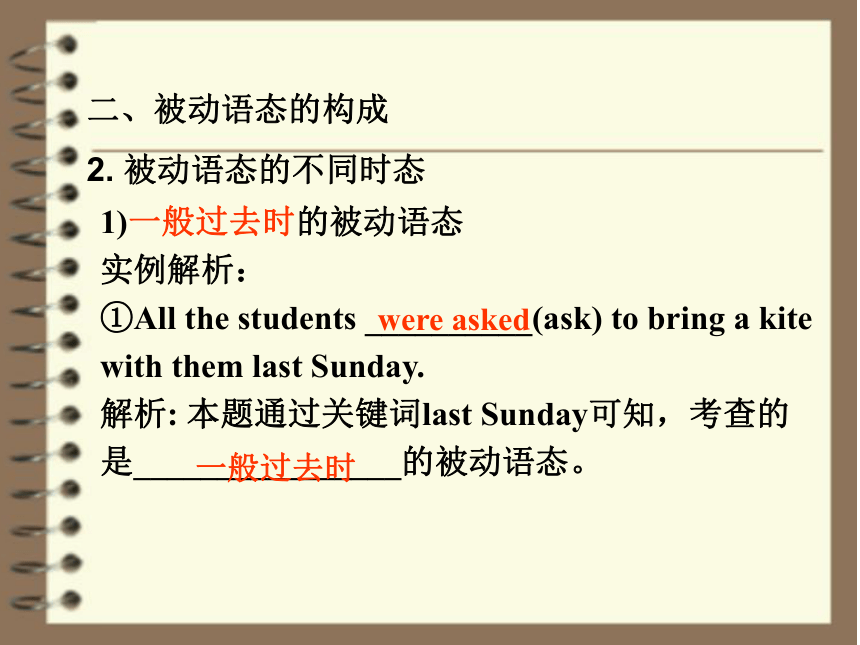
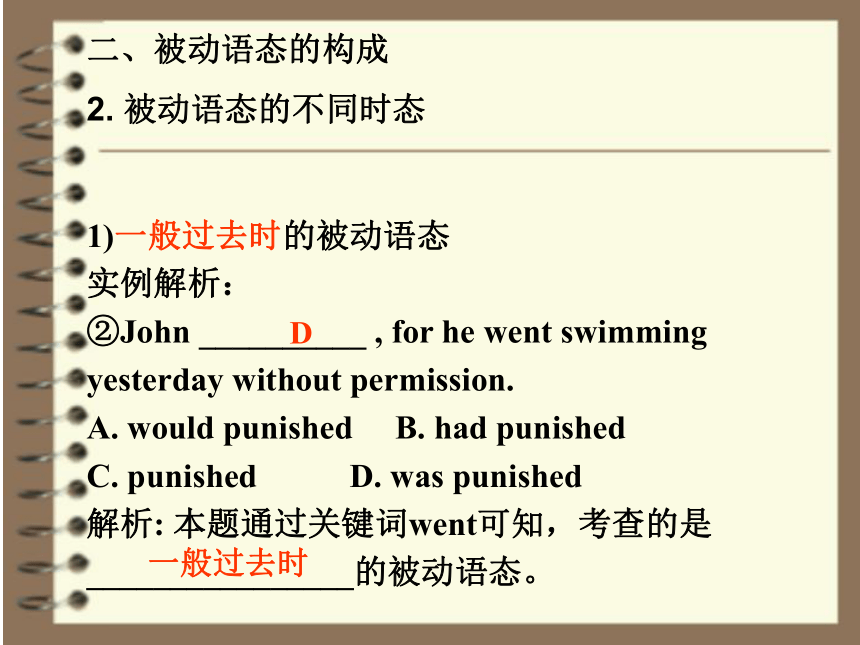
文档简介
(共34张PPT)
一、被动语态概述
1. 何为被动语态
英语中有两种语态:_________和_________
1) Many people speak English.
谓语speak的动作是由主语__________来执行的,
为主动语态,表示主语是动作_________。
2) English is spoken by many people.
主语English承受谓语speak的动作,为被动语态,
表示主语是动作的__________。
主动语态
被动语态
many people
执行者
承受者
一、被动语态概述
2. 何时用被动语态:被动语态常用于下列几种情况:
1) Salt is produced in East and South China.
不知道动作的执行者
2)Our school was set up in 1973.
没必要指出动作的执行者。
3) Chinese is spoken by the larget number of people.
需要突出或强调动作的承受者。
注意: 只有(及物动词/不及物动词)才有被动语态。
二、被动语态的构成
1. 被动语态的基本构成
Many people
English
speak
English.
is spoken
by many people.
构成
可见,被动语态是由________________________
构成的。
be + vt. p. p.
二、被动语态的构成
2. 被动语态的不同时态
我们已知,被动语态由“助动词be+及物动词的过
去分词“构成的。而被动语态的不同时态是通过动
助动词______的时态变化来表示的,过分分词
部分不变。
be
(二) 被动语态的时态、人称和数的变化
主要体现在be的变化上,其形式与系动词be的变化形式完全一样。以 give 为例,列表如下:
一般现在时:
一般过去时:
一般将来时:
一般过去将来时:
现在进行时:
过去进行时:
现在完成时:
过去完成时:
将来完成时:
过去将来完成时:
[注]被动语态没有将来进行时和过去将来进行时。
am / is / are + done
was / were + done
shall / will + be done
should / would + be done
am / is / are + being + done
was / were + being + done
have / has + been + done
had + been + done
shall / will + have been + done
should / would + have been + done
二、被动语态的构成
2. 被动语态的不同时态
1)一般现在时的被动语态
Dictionaries, use, in our English class, every day
___________________________________________
football, often, play, all over the world
___________________________________________
I, take good care of, by mother, every day
___________________________________________
由此可见,一般现在时的被动语态的构成是:____________________________
Dictionaries are used in our English class every day.
Football is often played all over the world.
I am taken good care of by mother every day.
am/is/are + vt. p.p.
二、被动语态的构成
2. 被动语态的不同时态
1)一般现在时的被动语态
实例解析:
① Chinese _______ by the largest number of people.
A.speak B.is speaking
C.speaks D.is spoken
解析: 本题答案为______,
考查的是______________的被动语态。
D
一般现在时
二、被动语态的构成
2. 被动语态的不同时态
1)一般现在时的被动语态
实例解析:
②If the work ____________ tomorrow afternoon, we will go and play basketball.
A. finished B. has finished
C. will be finished D. is finished
解析: 本题答案为_____。有两个考点: 考点1)由if引导的条件状语从句,______________ 考点2) ______________的被动语态。
。
D
主将从现
一般现在时
二、被动语态的构成
2. 被动语态的不同时态
2)一般过去时的被动语态
a bank, rob, yesterday _________________________
the tiger, kill, by him, last year
__________________________________________
the bridge, build, in 2001. ______________________________________
由此可见,一般过去时的被动语态的构成是: ____________________________
A bank was robbed yesterday.
The tiger was killed by him last year.
The bridge was built in 2001.
was/were + vt. p.p.
二、被动语态的构成
2. 被动语态的不同时态
1)一般过去时的被动语态
实例解析:
①All the students __________(ask) to bring a kite with them last Sunday.
解析: 本题通过关键词last Sunday可知,考查的是________________的被动语态。
were asked
一般过去时
二、被动语态的构成
2. 被动语态的不同时态
1)一般过去时的被动语态
实例解析:
②John __________ , for he went swimming yesterday without permission.
A. would punished B. had punished
C. punished D. was punished
解析: 本题通过关键词went可知,考查的是________________的被动语态。
D
一般过去时
二、被动语态的构成
2. 被动语态的不同时态
1)一般将来时的被动语态
1. the ground, cover with, trees, in two years
___________________________________________
2. the patient, send to hospital, after a while
___________________________________________
3. a talk, give, next week
___________________________________________
由此可见,一般将来时的被动语态的构成是: _____________________________
The ground will be covered with trees in two years.
The patient will be sent to hospital after a while.
A talk will be/is going to be given next week.
shall /will be/be going to be + vt.p.p.
二、被动语态的构成
2. 被动语态的不同时态
1)一般将来时的被动语态
实例解析:
① A meeting _________________________ to discuss this problem by them.
他们将要开会讨论这个问题。(完成句子)
解析: meeting和hold是被动的关系,由于是“将要”,故应填_____________________
will be held
二、被动语态的构成
2. 被动语态的不同时态
1)一般将来时的被动语态
② The new school _________ when the new term begins.
A. finishes B. will finish
C. will be finished D. would finish
解析: 本题考查的是一般将来时的被动语态。
C
二、被动语态的构成
2. 被动语态的不同时态
3)含有情态动词的被动语态
句型转换:
We must look after the dog. (转化为被动语态)
The dog must be looked after by us.
由此可见,含有情态动词的被动语态的构成是:
_____________________________
must (can/could/may)+be + vt. p.p.
二、被动语态的构成
3)含有情态动词的被动语态
① A lot of new roads __ built in the west of China.
A.must B.must be C.has D.have
② The new school _ before the new term begins.
A. finishes B. must finish
C. must be finished D. would finish
③ The programmes __ easily if you use a short wave radio.
A. can pick up B. pick up
C. picked up D. can be picked up
二、被动语态的构成
2. 被动语态的不同时态
3) 现在完成时的被动语态
Two hundred trees have been planted by now.
The book has been read many times by me.
Several soldiers have already been killed ...
由此可见,现在完成时的被动语态的构成是:
____________________________
have / has +been + vt.p.p.
二、被动语态的构成
2. 被动语态的不同时态
3) 现在完成时的被动语态
实例解析:
词型转换:
① The food ___________________ already. (eat up)
② The flowers____________________ three
times since this morning. (water)
has been eaten up
have been watered
二、被动语态的构成
2. 被动语态的不同时态
3) 其他时态的被动语态
现在进行时的被动语态, 结构: _________________________________
过去进行时的被动语态, 结构: _________________________________
过去完成时的被动语态, 结构: _________________________________
be (am / is / are) + being + vt.p.p.
be (was/were) + being + vt.p.p.
had +been + vt.p.p.
二、被动语态的构成
被动语态的构成小结: 以ask为例,
时 间 一 般 进 行 完 成
现 在 am/is/are asked
被问 am/is/are being asked
正在被问 have/has been asked
已经被问过
过 去 was/were asked
(过去)被问 was/were being asked
(过去)正被问 had been asked
(过去)已被问过
将 来 shall/will be asked
将要被问
过去将来 should/would be asked
(过去)将要被问
三、主动语态变为被动语态
1、主动语态变为被动语态的步骤:
1)将主动句的宾语变为主语:
注意:如果主动句的宾语是代词,
需将其由宾格变为________。如: Tom killed him. → _____________________________ 2) 将动词改为"be+过去分词"。 注意:
They held a meeting yesterday. →_______________________. (3)将主动语态的主语改为by…放在谓语动词后。 注意:如果原主语是代词,则应由主格变为_______。
He sang a song ________________________.
主格
He was killed by Tom.
A meeting was held by them yesterday.
宾格
A song was sung by him.
1. Someone will write a report about the accident .
2. All the students take computer lessons once a week.
3. They must send the letter today.
A report about the accident ______________.
Computer lessons _________ by all the students once a week .
The letter _________________today.
一、 被动语态结构练习
will be written
are taken
must be sent
4. Someone has stolen my bike
5. He gave her some money.
_________________________
_________________________
My bike___________________.
She was given some money.
has been stolen
Some money was given to her.
(六)语态转换时要注意的问题
1. 把主动语态变为被动语态时,其谓语动词的时态要与原句时态保持一致,其谓语动词的数要与新主语保持一致。
We have bought a new computer.
A new computer has been bought. (正确)
A new computer have been bought. (错误)
2. 含有双宾语的主动句变被动句时,可分别将其中的一个宾语变为主语,另一个不动,一般变间接宾语为主语时比较多。
My uncle gave me a present on my birthday.
I was given a present on my birthday.
如果把直接宾语(指物)改为主语,则在间接宾语(指人)前加适当的介词,如上句还可以说:
A present was given to me yesterday.
保留宾语
Tips: ‘物’和‘人’都可作主语,但‘物’作主语时在宾语前要加 “to” 或 “for”
He gave her some money.
-- She was given some money.
-- Some money was given to her.
二、被动语态双宾语
人
物
接双宾语的还有 buy、make 、give、pass 、show
___
____________
sth be for sb
bought
made
sth be to sb
given
passed
shown
He showed me a photo.
_______________________
_______________________
2. You will give her a book tomorrow .
______________________________.
_______________________________.
I was shown a photo.
A photo was shown to me.
She will be given a book tomorrow.
A book will be given to her tomorrow.
二、被动语态双宾语练习
3. He bought her a watch.
____________________________
____________________________
She was bought a watch
A watch was bought for her.
4. My father made me a cake.
A cake __________________ by my father
二、被动语态双宾语练习
was made for me
5. My father made me do the work.
I ________________ the work by my father.
was made to do
3. 由动词+ 介词或副词构成的短语动词,要把它们作为整体看,即把它们看成一个及物动词,介词或副词不可拆开或漏掉。这类动词有:
不及物动词+ 介词,如: agree to, ask for, laugh at, operated on, listen to, look after, think of, talk about 等。
The patient is being operated on.
The problem is solved. It needn't be talked about.
下列情况主动句不能改为被动句:
第一,感官系动词一般用主动形式表示被动意义,如:
feel,look, seem, taste, sound, remain等。
— Do you like the material
— Yes, it feels very soft.
误:It is felt very soft.
The food tastes delicious.
误:The food is tasted delicious.
The pop music sounds beautiful.
误:The pop music is sounded beautiful.
第二,谓语是及物动词leave, enter, reach, suit, have, benefit, lack, own等。如:
He entered the room and got his book.
误:The room was entered and his book was got.
She had her hand burned.
误:Her hand was had burned.
第三,一些不及物动词短语没有被动语态,如:take place, break out, belong to, lose heart, consist of, add up to等。如:
The fire broke out in the capital building.
误:The fire was broke out in the capital building.
第四,不及物动词没有被动语态,
如:rise, happen, succeed, remain, lie等。
When we got to the top of the mountain,
the sun had already risen.
误:The sun had already been risen.
After the earthquake, few houses remained.
误:After the earthquake, few houses
were remained.
11. 在汉语中,有一类句子不出现主语,在英语中一般可
被动结构来表示,例如:
据说…… It is said that …
据报导…… It is reported that …
据推测…… It is supposed that …
希望…… It is hoped that …
众所周知…… It is well known that …
普遍认为…… It is generally considered that …
有人建议…… It is suggested that …
1) It is reported that it is going to rain tomorrow.
2) It is well known that Thomas Edison invented the electric lamp.
一、被动语态概述
1. 何为被动语态
英语中有两种语态:_________和_________
1) Many people speak English.
谓语speak的动作是由主语__________来执行的,
为主动语态,表示主语是动作_________。
2) English is spoken by many people.
主语English承受谓语speak的动作,为被动语态,
表示主语是动作的__________。
主动语态
被动语态
many people
执行者
承受者
一、被动语态概述
2. 何时用被动语态:被动语态常用于下列几种情况:
1) Salt is produced in East and South China.
不知道动作的执行者
2)Our school was set up in 1973.
没必要指出动作的执行者。
3) Chinese is spoken by the larget number of people.
需要突出或强调动作的承受者。
注意: 只有(及物动词/不及物动词)才有被动语态。
二、被动语态的构成
1. 被动语态的基本构成
Many people
English
speak
English.
is spoken
by many people.
构成
可见,被动语态是由________________________
构成的。
be + vt. p. p.
二、被动语态的构成
2. 被动语态的不同时态
我们已知,被动语态由“助动词be+及物动词的过
去分词“构成的。而被动语态的不同时态是通过动
助动词______的时态变化来表示的,过分分词
部分不变。
be
(二) 被动语态的时态、人称和数的变化
主要体现在be的变化上,其形式与系动词be的变化形式完全一样。以 give 为例,列表如下:
一般现在时:
一般过去时:
一般将来时:
一般过去将来时:
现在进行时:
过去进行时:
现在完成时:
过去完成时:
将来完成时:
过去将来完成时:
[注]被动语态没有将来进行时和过去将来进行时。
am / is / are + done
was / were + done
shall / will + be done
should / would + be done
am / is / are + being + done
was / were + being + done
have / has + been + done
had + been + done
shall / will + have been + done
should / would + have been + done
二、被动语态的构成
2. 被动语态的不同时态
1)一般现在时的被动语态
Dictionaries, use, in our English class, every day
___________________________________________
football, often, play, all over the world
___________________________________________
I, take good care of, by mother, every day
___________________________________________
由此可见,一般现在时的被动语态的构成是:____________________________
Dictionaries are used in our English class every day.
Football is often played all over the world.
I am taken good care of by mother every day.
am/is/are + vt. p.p.
二、被动语态的构成
2. 被动语态的不同时态
1)一般现在时的被动语态
实例解析:
① Chinese _______ by the largest number of people.
A.speak B.is speaking
C.speaks D.is spoken
解析: 本题答案为______,
考查的是______________的被动语态。
D
一般现在时
二、被动语态的构成
2. 被动语态的不同时态
1)一般现在时的被动语态
实例解析:
②If the work ____________ tomorrow afternoon, we will go and play basketball.
A. finished B. has finished
C. will be finished D. is finished
解析: 本题答案为_____。有两个考点: 考点1)由if引导的条件状语从句,______________ 考点2) ______________的被动语态。
。
D
主将从现
一般现在时
二、被动语态的构成
2. 被动语态的不同时态
2)一般过去时的被动语态
a bank, rob, yesterday _________________________
the tiger, kill, by him, last year
__________________________________________
the bridge, build, in 2001. ______________________________________
由此可见,一般过去时的被动语态的构成是: ____________________________
A bank was robbed yesterday.
The tiger was killed by him last year.
The bridge was built in 2001.
was/were + vt. p.p.
二、被动语态的构成
2. 被动语态的不同时态
1)一般过去时的被动语态
实例解析:
①All the students __________(ask) to bring a kite with them last Sunday.
解析: 本题通过关键词last Sunday可知,考查的是________________的被动语态。
were asked
一般过去时
二、被动语态的构成
2. 被动语态的不同时态
1)一般过去时的被动语态
实例解析:
②John __________ , for he went swimming yesterday without permission.
A. would punished B. had punished
C. punished D. was punished
解析: 本题通过关键词went可知,考查的是________________的被动语态。
D
一般过去时
二、被动语态的构成
2. 被动语态的不同时态
1)一般将来时的被动语态
1. the ground, cover with, trees, in two years
___________________________________________
2. the patient, send to hospital, after a while
___________________________________________
3. a talk, give, next week
___________________________________________
由此可见,一般将来时的被动语态的构成是: _____________________________
The ground will be covered with trees in two years.
The patient will be sent to hospital after a while.
A talk will be/is going to be given next week.
shall /will be/be going to be + vt.p.p.
二、被动语态的构成
2. 被动语态的不同时态
1)一般将来时的被动语态
实例解析:
① A meeting _________________________ to discuss this problem by them.
他们将要开会讨论这个问题。(完成句子)
解析: meeting和hold是被动的关系,由于是“将要”,故应填_____________________
will be held
二、被动语态的构成
2. 被动语态的不同时态
1)一般将来时的被动语态
② The new school _________ when the new term begins.
A. finishes B. will finish
C. will be finished D. would finish
解析: 本题考查的是一般将来时的被动语态。
C
二、被动语态的构成
2. 被动语态的不同时态
3)含有情态动词的被动语态
句型转换:
We must look after the dog. (转化为被动语态)
The dog must be looked after by us.
由此可见,含有情态动词的被动语态的构成是:
_____________________________
must (can/could/may)+be + vt. p.p.
二、被动语态的构成
3)含有情态动词的被动语态
① A lot of new roads __ built in the west of China.
A.must B.must be C.has D.have
② The new school _ before the new term begins.
A. finishes B. must finish
C. must be finished D. would finish
③ The programmes __ easily if you use a short wave radio.
A. can pick up B. pick up
C. picked up D. can be picked up
二、被动语态的构成
2. 被动语态的不同时态
3) 现在完成时的被动语态
Two hundred trees have been planted by now.
The book has been read many times by me.
Several soldiers have already been killed ...
由此可见,现在完成时的被动语态的构成是:
____________________________
have / has +been + vt.p.p.
二、被动语态的构成
2. 被动语态的不同时态
3) 现在完成时的被动语态
实例解析:
词型转换:
① The food ___________________ already. (eat up)
② The flowers____________________ three
times since this morning. (water)
has been eaten up
have been watered
二、被动语态的构成
2. 被动语态的不同时态
3) 其他时态的被动语态
现在进行时的被动语态, 结构: _________________________________
过去进行时的被动语态, 结构: _________________________________
过去完成时的被动语态, 结构: _________________________________
be (am / is / are) + being + vt.p.p.
be (was/were) + being + vt.p.p.
had +been + vt.p.p.
二、被动语态的构成
被动语态的构成小结: 以ask为例,
时 间 一 般 进 行 完 成
现 在 am/is/are asked
被问 am/is/are being asked
正在被问 have/has been asked
已经被问过
过 去 was/were asked
(过去)被问 was/were being asked
(过去)正被问 had been asked
(过去)已被问过
将 来 shall/will be asked
将要被问
过去将来 should/would be asked
(过去)将要被问
三、主动语态变为被动语态
1、主动语态变为被动语态的步骤:
1)将主动句的宾语变为主语:
注意:如果主动句的宾语是代词,
需将其由宾格变为________。如: Tom killed him. → _____________________________ 2) 将动词改为"be+过去分词"。 注意:
They held a meeting yesterday. →_______________________. (3)将主动语态的主语改为by…放在谓语动词后。 注意:如果原主语是代词,则应由主格变为_______。
He sang a song ________________________.
主格
He was killed by Tom.
A meeting was held by them yesterday.
宾格
A song was sung by him.
1. Someone will write a report about the accident .
2. All the students take computer lessons once a week.
3. They must send the letter today.
A report about the accident ______________.
Computer lessons _________ by all the students once a week .
The letter _________________today.
一、 被动语态结构练习
will be written
are taken
must be sent
4. Someone has stolen my bike
5. He gave her some money.
_________________________
_________________________
My bike___________________.
She was given some money.
has been stolen
Some money was given to her.
(六)语态转换时要注意的问题
1. 把主动语态变为被动语态时,其谓语动词的时态要与原句时态保持一致,其谓语动词的数要与新主语保持一致。
We have bought a new computer.
A new computer has been bought. (正确)
A new computer have been bought. (错误)
2. 含有双宾语的主动句变被动句时,可分别将其中的一个宾语变为主语,另一个不动,一般变间接宾语为主语时比较多。
My uncle gave me a present on my birthday.
I was given a present on my birthday.
如果把直接宾语(指物)改为主语,则在间接宾语(指人)前加适当的介词,如上句还可以说:
A present was given to me yesterday.
保留宾语
Tips: ‘物’和‘人’都可作主语,但‘物’作主语时在宾语前要加 “to” 或 “for”
He gave her some money.
-- She was given some money.
-- Some money was given to her.
二、被动语态双宾语
人
物
接双宾语的还有 buy、make 、give、pass 、show
___
____________
sth be for sb
bought
made
sth be to sb
given
passed
shown
He showed me a photo.
_______________________
_______________________
2. You will give her a book tomorrow .
______________________________.
_______________________________.
I was shown a photo.
A photo was shown to me.
She will be given a book tomorrow.
A book will be given to her tomorrow.
二、被动语态双宾语练习
3. He bought her a watch.
____________________________
____________________________
She was bought a watch
A watch was bought for her.
4. My father made me a cake.
A cake __________________ by my father
二、被动语态双宾语练习
was made for me
5. My father made me do the work.
I ________________ the work by my father.
was made to do
3. 由动词+ 介词或副词构成的短语动词,要把它们作为整体看,即把它们看成一个及物动词,介词或副词不可拆开或漏掉。这类动词有:
不及物动词+ 介词,如: agree to, ask for, laugh at, operated on, listen to, look after, think of, talk about 等。
The patient is being operated on.
The problem is solved. It needn't be talked about.
下列情况主动句不能改为被动句:
第一,感官系动词一般用主动形式表示被动意义,如:
feel,look, seem, taste, sound, remain等。
— Do you like the material
— Yes, it feels very soft.
误:It is felt very soft.
The food tastes delicious.
误:The food is tasted delicious.
The pop music sounds beautiful.
误:The pop music is sounded beautiful.
第二,谓语是及物动词leave, enter, reach, suit, have, benefit, lack, own等。如:
He entered the room and got his book.
误:The room was entered and his book was got.
She had her hand burned.
误:Her hand was had burned.
第三,一些不及物动词短语没有被动语态,如:take place, break out, belong to, lose heart, consist of, add up to等。如:
The fire broke out in the capital building.
误:The fire was broke out in the capital building.
第四,不及物动词没有被动语态,
如:rise, happen, succeed, remain, lie等。
When we got to the top of the mountain,
the sun had already risen.
误:The sun had already been risen.
After the earthquake, few houses remained.
误:After the earthquake, few houses
were remained.
11. 在汉语中,有一类句子不出现主语,在英语中一般可
被动结构来表示,例如:
据说…… It is said that …
据报导…… It is reported that …
据推测…… It is supposed that …
希望…… It is hoped that …
众所周知…… It is well known that …
普遍认为…… It is generally considered that …
有人建议…… It is suggested that …
1) It is reported that it is going to rain tomorrow.
2) It is well known that Thomas Edison invented the electric lamp.
